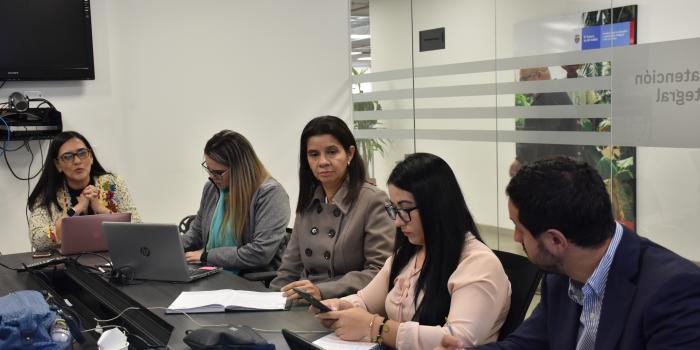
Honduras municipalities seek to imitate Colombia's experience in caring for victims of displacement
Executives, professionals and technicians of the Victims Unit met with a delegation from the Central American country, to exchange experiences and information on various issues related to victims.

As part of the South-South Cooperation Strategy, in partnership with the UN Agency for Refugees Acnur, the Victims Unit was visited by a delegation of officials from the municipalities of Tegucigalpa, San Pedro Sula and El Progreso ( Honduras), in order to share with them the experience of the entity in relation to the Public Policy of Victims, Returns and Relocations, Territorial Nation Coordination and Emergency Assistance.
Lilia Umaña Montiel, vice mayor of the Municipality of San Pedro Sula, said that the intention of the visit is “to collect the experience of everything Colombia has lived in recent years in planning, in the study and development of the policy of Attention to the victims. Also to work in prevention. As citizens we are initiating this project because we need to implement good practices in our city, where we have many problems, many victims displaced by violence and affected by the socio-political situation of the country”.
Nicolás Fernández de Soto, International Cooperation Coordinator of the Victims Unit, explained that “the idea is that they can replicate certain strategies and activities that we do here in Colombia and can develop them in Honduras, especially in the area of mass displacements and on how the Unit has been attending and prioritizing these victims”.
“We are interested in implementing the policy to attend to those displaced by violence and knowing the process that Colombia lived, today we are here to learn what internal displacement means, what is the return and relocations, for us to work with that same methodology and be able to help the victims. Recall that our country is affected by problems of organized crime,” said Araminta Pereira Ortega, governor of El Progreso Municipality.
The visit of this Honduran mission was framed in the South-South Cooperation Strategy 2019, defined by the Ministry of Foreign Affairs and the Presidential Cooperation Agency of Colombia, within the strategies for Mesoamerica.
In 2013, the Honduras government through Decree PCM 053 recognized the existence of internal forced displacement as a result of organized crime and widespread violence. In order to design the response to the situation, it formed the Inter-Institutional Commission for the Protection of Persons Displaced by Violence (CIPPDV) under the leadership of Human Rights Secretariat, Justice, Governance and Decentralization and the participation of 14 Government entities and 4 civil society organizations He also requested the United Nations High Commissioner for Refugees (UNHCR) to provide technical advice for the design of displaced response system.
The Victims Unit has become an international technical advisor consulted by other countries, such as Mexico, Guatemala, El Salvador, Peru and now Honduras, who have been interested in exchanging experiences and information with the Unit, which is the Colombian entity in charge of lead the implementation of Law 1448 of 2011 and which deals with about 9 million survivors of violence registered in the Unique Victims Registry.
(End/LMY)






